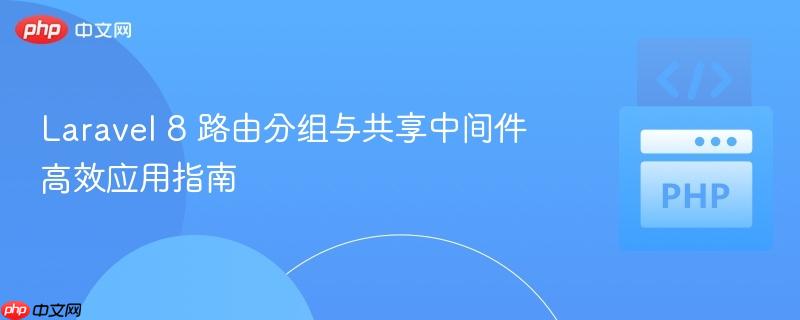
本文详细介绍了在 laravel 8 中如何高效地利用路由分组来为一组路由应用共享中间件,从而显著减少代码冗余并提升可维护性。通过实际代码示例,演示了如何将认证中间件统一应用于多个受保护的路由,并进一步探讨了利用全局路由参数约束来优化路由定义的最佳实践。
在 Laravel 应用程序开发中,为特定功能模块的多个路由应用相同的中间件(例如身份认证、权限检查或日志记录)是常见的需求。然而,如果为每个路由单独添加中间件,代码会变得冗余且难以维护,尤其当路由数量增多时。
考虑以下场景,您需要为多个页面操作(如首页展示、编辑、删除)都要求用户必须登录(即通过 auth 中间件验证):
Route::get('/', [PagesController::class,'index'])
->middleware('auth');
Route::get('edit/{id}', [PagesController::class,'editPage'])
->middleware('auth')
->where('id', '[0-9]+');
Route::post('edit/{id}', [PagesController::class,'editItem'])
->middleware('auth')
->where('id', '[0-9]+');
Route::get('delete/{id}', [PagesController::class,'deletePage'])
->middleware('auth')
->where('id', '[0-9]+');
Route::post('delete/{id}', [PagesController::class,'deleteItem'])
->middleware('auth')
->where('id', '[0-9]+');可以看到,->middleware('auth') 在此示例中被重复应用了多次。Laravel 提供了路由分组(Route Groups)功能来解决此类问题。通过将具有共同属性(如中间件、命名空间、前缀等)的路由集合到一个组中,可以统一配置这些属性,从而避免重复代码。
要为上述路由应用共享的 auth 中间件,可以使用 Route::middleware() 方法结合 group() 方法:
use App\Http\Controllers\PagesController; // 确保引入控制器
Route::middleware(['auth'])->group(function () {
Route::get('/', [PagesController::class,'index']);
Route::get('edit/{id}', [PagesController::class,'editPage'])
->where('id', '[0-9]+');
Route::post('edit/{id}', [PagesController::class,'editItem'])
->where('id', '[0-9]+');
Route::get('delete/{id}', [PagesController::class,'deletePage'])
->where('id', '[0-9]+');
Route::post('delete/{id}', [PagesController::class,'deleteItem'])
->where('id', '[0-9]+');
});在这个示例中,Route::middleware(['auth']) 定义了一个中间件数组,然后 group() 方法将所有内部定义的路由都自动应用了 auth 中间件。这极大地简化了路由定义,提升了代码的可读性和可维护性。
除了中间件的重复应用,上述代码中 ->where('id', '[0-9]+') 也被多次定义,用于确保 id 参数必须是数字。Laravel 允许您定义全局的路由参数约束,避免在每个路由中重复设置。
您可以在 app/Providers/RouteServiceProvider.php 文件的 boot 方法中,使用 Route::pattern() 方法来定义全局约束:
// app/Providers/RouteServiceProvider.php
use Illuminate\Support\Facades\Route;
use Illuminate\Foundation\Support\Providers\RouteServiceProvider as ServiceProvider;
class RouteServiceProvider extends ServiceProvider
{
// ... 其他代码 ...
/**
* Define your route model bindings, pattern filters, etc.
*
* @return void
*/
public function boot()
{
// ... 其他 boot 方法中的代码 ...
// 定义 'id' 参数必须是数字
Route::pattern('id', '[0-9]+');
$this->routes(function () {
Route::middleware('web')
->namespace($this->namespace)
->group(base_path('routes/web.php'));
// ... 其他路由文件 ...
});
}
}定义了全局约束后,您的路由定义可以进一步简化:
use App\Http\Controllers\PagesController;
Route::middleware(['auth'])->group(function () {
Route::get('/', [PagesController::class,'index']);
// 'id' 约束已全局定义,无需在此处重复指定
Route::get('edit/{id}', [PagesController::class,'editPage']);
Route::post('edit/{id}', [PagesController::class,'editItem']);
Route::get('delete/{id}', [PagesController::class,'deletePage']);
Route::post('delete/{id}', [PagesController::class,'deleteItem']);
});现在,所有路由中名为 id 的参数都将自动应用 [0-9]+ 的正则表达式约束,无需在每个路由中单独指定。
通过使用 Laravel 的路由分组和全局路由参数约束功能,您可以:
在构建大型 Laravel 应用时,合理利用这些高级路由功能是编写高质量、可扩展代码的关键。建议将相关功能模块的路由进行分组,并充分利用全局约束来管理常用参数模式,从而保持路由文件的整洁和高效。

Copyright 2014-2025 https://www.php.cn/ All Rights Reserved | php.cn | 湘ICP备2023035733号